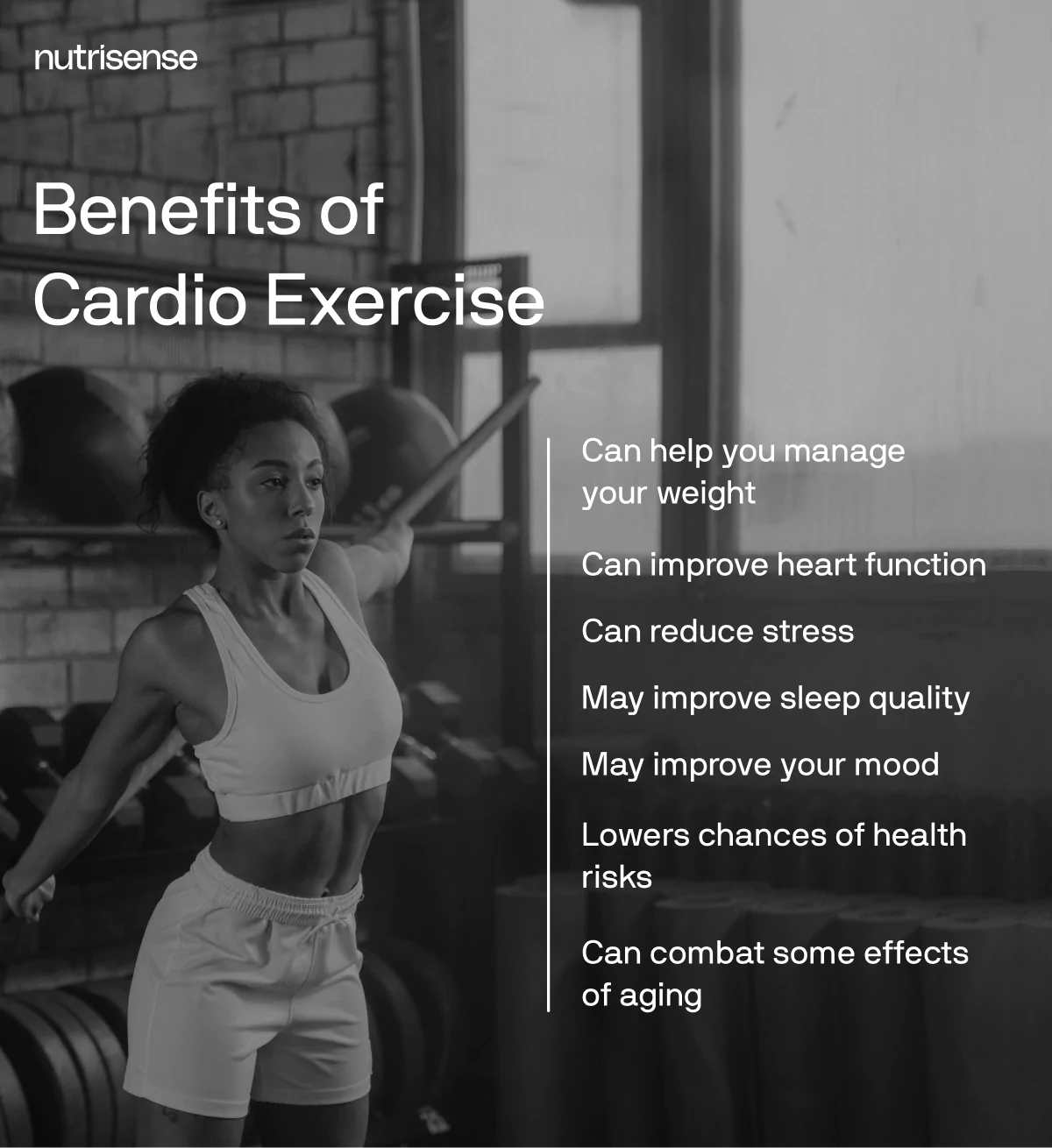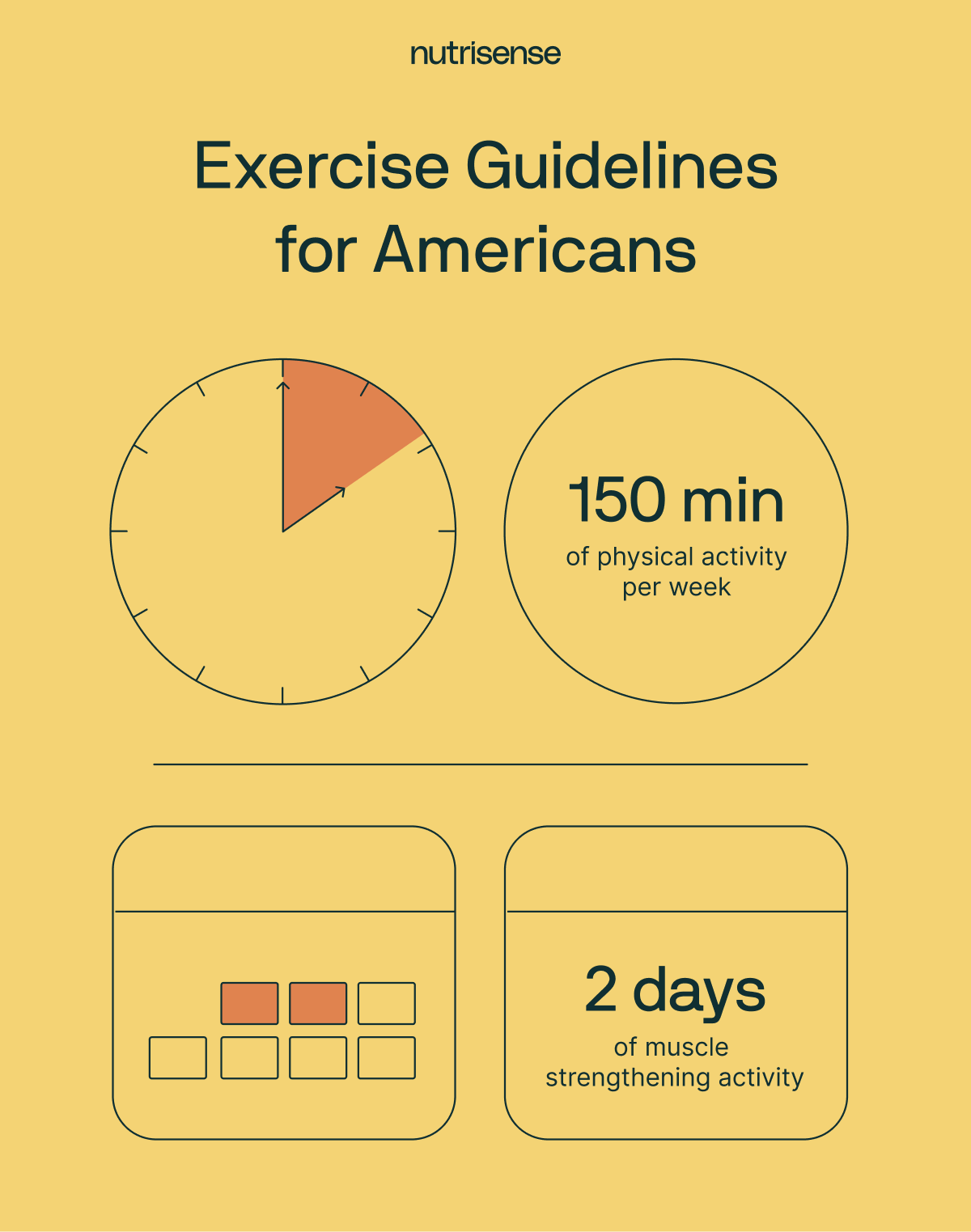Sweat it Out: The Top Benefits of Cardiovascular Fitness
.jpeg)
Key Takeaways
Cardiovascular exercise—or cardio, as it’s often called—is an essential part of almost any workout routine. Whether it’s a nice walk around the neighborhood, pedaling on the stationary bike, or even a sweat-breaking session on the treadmill, there are many ways to get your cardio training in.
The cardiovascular system supplies your organs with the oxygen and nutrients they need to do their jobs. And plainly put, aerobic and endurance training is shown to help strengthen cardiovascular health dramatically.
Love it or hate it, cardio is a big part of nearly any healthy lifestyle, and chances are, you’ve heard that there are many health benefits of cardiovascular exercise. But what are they, exactly? Keep reading to find out.
The Key Benefits of Cardiovascular Exercise

First, a little background on the cardiovascular system: "cardiovascular” refers to the system made up of your heart and the many blood vessels running throughout your body. Cardio: heart; vascular: vessels—easy enough, right?
So what counts as cardio exercise? Well, just about anything that gets your heart-rate elevated! Some common examples of cardiovascular exercise include:
- Brisk walking
- Jogging
- Running
- Cycling
- Swimming
- Hiking
- Rowing
- Boxing
- HIIT (high-intensity interval training)
Of course, the list goes on..and on. Everything from resistance training to climbing a set of stairs could be considered a form of cardiovascular exercise. So, what are the benefits of cardio and what specifically can cardio do to enhance your health and well-being? Let’s take a look.
Combined with a Healthy Diet, Cardio Can Help You Lose and Maintain Weight

According to research, cardio workouts may have a significant positive impact on, among other things:
- Body weight
- Body fat percentage and BMI
- Flexibility
- Overall cardio-respiratory fitness
Bodyweight can be thought of in terms of a balance between energy expenditure and energy consumption: for weight loss to occur, either energy expenditure must go up, or energy consumption must go down. However, that’s not always the full story for achieving weight loss goals.
While appropriate caloric restriction may be a component of weight loss, cardiovascular exercise may have the additional benefit of helping reduce total fat mass as well as improving cardiorespiratory fitness.
The best approach would likely involve a combination of appropriate exercise - including cardiovascular exercise - and a nutritional plan that compliments a given weight loss goal. Just remember to always give your body the nutrients it needs to keep pace with your training routine!
Improves Heart Function and Blood Circulation

How does cardiovascular exercise affect heart health? As you exercise, your heart rate increases.That, in turn, increases the amount of oxygen needed by your heart.
In order to meet this increased demand for oxygen, blood flow in the body ramps up. It’s a bit of an oversimplification, but the main takeaway is that cardio training engages and influences heart function and circulation.
With time, this kind of regular physical activity may encourage long-lasting adaptive changes within these systems in the body, potentially leading to lower blood pressure and a lower risk of heart disease.
Reduces Stress
Exercise is itself a type of metabolic stress. However, whether or not a stressor is harmful or helpful depends on the dose and the health context of the individual. This means that appropriate amounts and types of physical activity tailored to personal tolerance may help reduce stress.
Some research shows that regular aerobic exercise, even light walking, may be linked to a decrease in stress levels, as well as to a greater ability to cope with stress.
On the other hand, too much or too rigorous exercise without the appropriate nutritional intake or appreciation for individual tolerance may have a detrimental impact on stress levels.
Better Sleep Quality

Not only may cardio training help alleviate stress, but it may also prove beneficial when it comes to sleep. Research suggests that regular moderate to intensive aerobic exercise is associated with deeper, more restful sleep.
We all know how important sleep is—not just to how you feel, but to how you function as well. And whether you’re suffering from chronic insomnia, or just feeling a little less rested than you’d like to upon waking, cardiovascular exercise may just be the missing piece to the puzzle that is satisfying, restorative sleep.
Lifts Your Mood
Have you ever heard someone say they felt great after a nice jog or walk? When it comes to mental health, research is increasingly pointing to physical exercise as a potent tool for combatting low mood and related symptoms.
From mood regulation in healthy individuals, to remedial effects for sufferers of depression and OCD, cardiovascular exercise may have a significant impact on mood and psychological well-being.
Lowers Your Chances of Health Risks

From lowering cholesterol to improving heart rate variability, there are a number of different ways that cardio training may help to reduce the risk of various illnesses, including insulin resistance.
From enhancing vascular function to reducing inflammation, aerobic exercise may play an important role in reducing the cardiovascular risk-factors associated with aging.
Combats the Effects of Aging
Aside from its preventative potential, cardiovascular exercise may also have other significant anti-aging effects for older adults. According to research, regular aerobic exercise of moderate intensity is associated with the following benefits, among others:
- Improved oxygen uptake
- Prevention of muscle degeneration with age
- Enhanced muscular endurance
- Lower risk of osteoporosis
- Improved cognitive function and memory
- Reduced risk of Alzheimer’s disease
- Better glucose uptake and blood sugar regulation
It might not be the fountain of youth itself, but cardiovascular training just might be one great tool for ensuring graceful and healthy aging.
How Much Cardiovascular Exercise Do You Need?

According to the CDC and the Physical Activity Guidelines for Americans, most adults should aim for around 150 minutes of physical activity per week in order to prevent weight gain and induce moderate weight loss. And it’s not as if anything less simply goes to waste—every little bit counts!
While the benefits of cardiovascular training are immense on their own, consider adding in some functional strength training to round out your routine. Cardio and strength training compliment each other nicely, and a balanced workout routine may have even greater returns.
It’s important to remember that if you’re new to training, you’ll want to build up your exercise program slowly and make sure you’re not exceeding your fitness level. This can lead to injury and other unwanted side effects.
Are There Any Risks to Cardio Exercise?

While there are many health benefits to cardiovascular exercise, it all depends on duration and intensity. Past a certain point, cardio exercise may counterintuitively become harmful to cardiac health.
According to some studies, a cardio routine in excess of 10 hours per week may even adversely affect cardiovascular health. Like with most things in life, moderation is key! Ultimately, it depends on your individual context, including your health history. Consider speaking with your doctor and teaming up with a fitness and nutrition professional to help you create the best approach with the lowest risk.
Find the right Nutrisense programto turn insight into progress.
Go Beyond Glucose Data with Nutrisense
Your glucose can significantly impact how your body feels and functions. That’s why stable levels are an important factor in supporting overall wellbeing. But viewing glucose isn't enough. Nutrisense, you’ll be able to learn how to use your body's data to make informed lifestyle choices that support healthy living.
One-to-one coaching
Sign up to access insurance-covered video calls to work with a glucose expert: a personal registered dietitian or certified nutritionist who will help tailor your lifestyle and diet to your goals.
Monitor and measure what matters
With the Nutrisense CGM Program, you can monitor your glucose with health tech like glucose biosensors and continuous glucose monitor (CGM)s, and analyze the trends over time with the Nutrisense App. This will help you make the most informed choices about the foods you consume and their impact on your health.
Find your best fit
Ready to take the first step? Start with our quiz to find the right Nutrisense program to help you take control.

Heather is a Registered and Licensed Dietitian Nutritionist (RDN, LDN), subject matter expert, and technical writer, with a master's degree in nutrition science from Bastyr University. She has a specialty in neuroendocrinology and has been working in the field of nutrition—including nutrition research, education, medical writing, and clinical integrative and functional nutrition—for over 15 years.

.webp)


